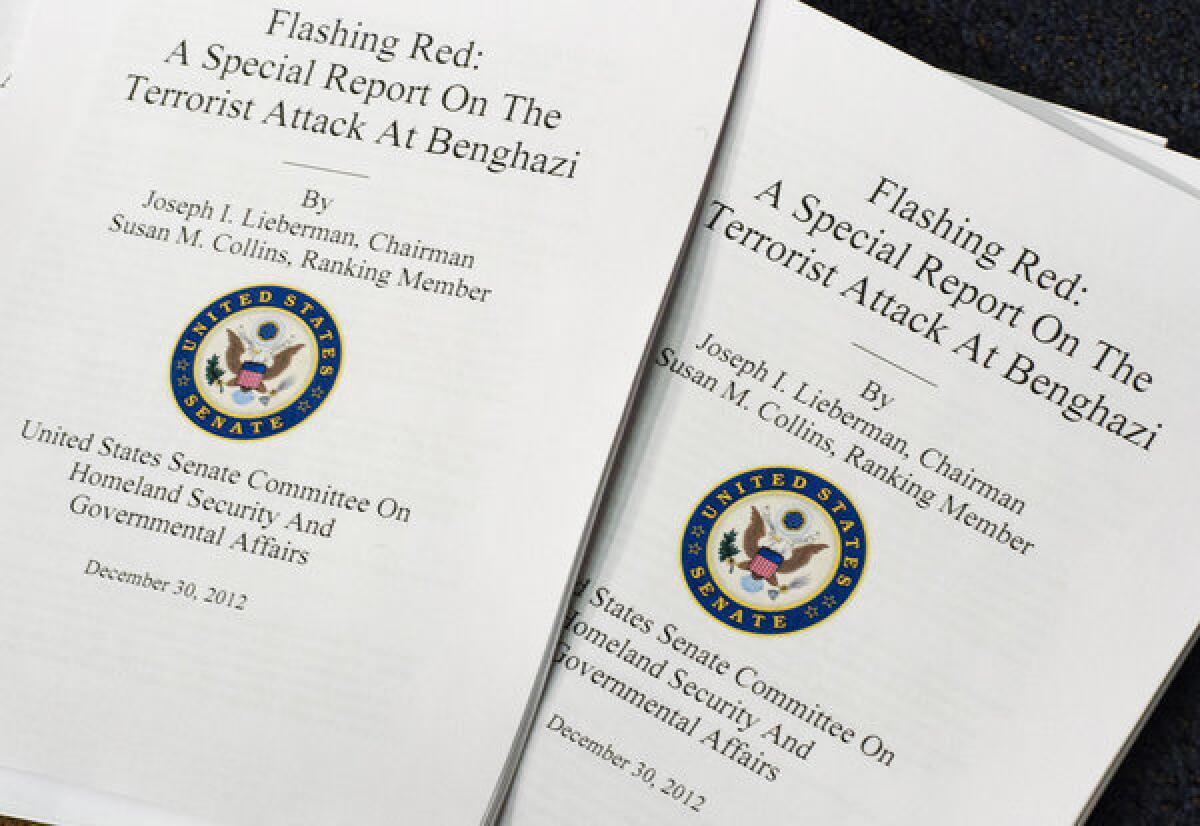Report faults State Department, intelligence for Benghazi failures

- Share via
WASHINGTON – The fatal attack on the U.S. consulate in Benghazi, Libya, on Sept. 11 was the culmination of a series of oversights and security failures, marking a “grievous mistake” by the State Department, according to a new Senate report.
The report, titled “Flashing Red,” was released Monday by Homeland Security and Governmental Affairs Committee Chairman Joseph Lieberman (I-Conn.) and ranking member Susan Collins (R-Maine). Focusing on what Lieberman called a “rising crescendo” of warnings the consulate was in danger, the analysis blames the State Department and intelligence community for a “woefully inadequate” response.
Citing a “large amount of evidence gathered by the U.S. intelligence community and from open sources,” the report asserts that there was an awareness that Benghazi was becoming “increasingly dangerous and unstable,” with a heightening risk of an attack on American installations.
PHOTOS: U.S. ambassador killed in Libya
And classified reports issued over a year prior to the attack, the report says, indicated that there was “a clear and vivid picture of a rapidly deteriorating threat.”
This information and requests from security personnel, though distributed within the intelligence community and the State Department, “did not lead to a commensurate increase in security at Benghazi nor to a decision to close the American mission there,” the report concludes. Either decision, the report contends, would have been “more than justified.”
As a result of those failures, the terrorists who carried out the attack “essentially walked right into the compound virtually unimpeded and set it ablaze,” Collins said.
Worse yet, Collins added, the Defense Department “had neither the personnel nor other assets close enough to reach Benghazi in a timely fashion” following the attack.
The State and Defense departments should also have been more adaptive to Libya’s inability to carry out its responsibility to provide adequate security to diplomatic instillation, “not because it lacked the will,” but because it had no capacity to do so, Lieberman said.
The report was also critical of the “inconsistent” talking points used by President Obama’s administration and provided by the intelligence community.
PHOTOS: Notable moments of the 2012 presidential election
“Administration officials were inconsistent in stating publicly that the deaths in Benghazi were the result of a terrorist attack,” the report says, siding with Republican critics who have attacked the administration for its early explanation of the tragedy.
The political fallout from that description has already claimed the possible nomination of U.N. Ambassador Susan Rice to replace outgoing Secretary of State Hillary Clinton. Clinton’s own testimony on the incident was delayed due to medical concerns.
The State Department has previously taken responsibility for its failures in safeguarding Ambassador Chris Stevens and three other Americans killed in the attack and has promised to take a “clear-eyed look at serious, systemic problems,” in the words of Deputy Secretary William Burns.
Follow Politics Now on Twitter and Facebook
More to Read
Get the L.A. Times Politics newsletter
Deeply reported insights into legislation, politics and policy from Sacramento, Washington and beyond. In your inbox twice per week.
You may occasionally receive promotional content from the Los Angeles Times.









